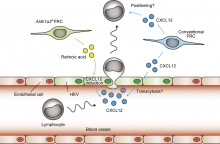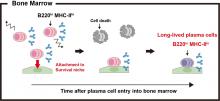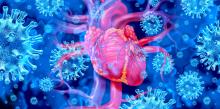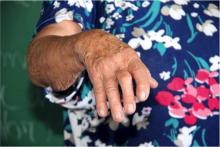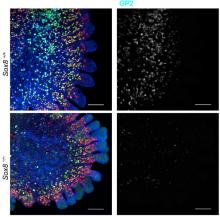Journal of Experimental Medicine
News
23 Mar 2023
Researchers from Osaka University identified a subset of fibroblastic reticular cells (FRCs) that simultaneously express two proteins, Aldh1a2 and Tie2, making them unique to areas of the omentum called milky spots. Genetic depletion of these cells caused structural disruption of milky spots. The FRCs were critical to the abdominal immune system as they regulated CXCL12 levels, a molecule necessary for lymphocyte recruitment from blood circulation. These insights can help develop novel treatments for intra-abdominal infections.
14 Dec 2022
Researchers led by Osaka University generated a time-stamping method to trace the development and survival of plasma cells in the bone marrow and spleen. Using a mouse model in which plasma cells were fluorescently labeled in an inducible manner, they found that plasma cells were continuously replenished by new cells, a small portion of which differentiated into long-lived plasma cells (LLPCs). These findings may aid in the development of new vaccines that efficiently induce LLPCs.
22 Sep 2022
Scientists have uncovered how Coxsackievirus B3, the most common cause for viral heart inflammation, takes advantage of a specific heart sensor to trigger chronic inflammation that can lead to heart failure.
09 Sep 2022
While the primary site of SARS-CoV-2 infection is in the nose, most antiviral immunity studies have been performed with peripheral blood. T-cell analysis of nasal swab samples suggests getting infected with SARS-CoV-2 following vaccination could confer potentially more robust, nasal-based immunity.
17 May 2022
Adenosine triphosphate (ATP) secreted from sensory neuron-interneuron crosstalk is key to the spreading of inflammation across joints, acting as a neurotransmitter and inflammation enhancer.
08 Apr 2019
Joint press release by Hokkaido University and Keio University
Scientists have identified a protein critical to the immune system development and antibody production in mice, which could contribute to understanding the gut defense mechanism in infants.

18 Jan 2008
A research team with members from Japan and the US has discovered a means of inducing persistent immunity to tumors in mice. In the long term, the work could lead to a vaccine against certain tumors in people.
Events
Sorry, no events coming up for this topic.
Researchers
Sorry, no researchers coming up for this topic.
Giants in history
Sorry, no researchers coming up for this topic.


